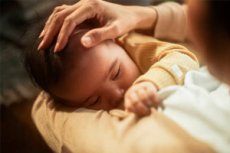US Pediatrics Association approves breastfeeding for HIV-infected people
Sist anmeldt: 14.06.2024

Alt iLive-innhold blir gjennomgått med medisin eller faktisk kontrollert for å sikre så mye faktuell nøyaktighet som mulig.
Vi har strenge retningslinjer for innkjøp og kun kobling til anerkjente medieområder, akademiske forskningsinstitusjoner og, når det er mulig, medisinsk peer-evaluerte studier. Merk at tallene i parenteser ([1], [2], etc.) er klikkbare koblinger til disse studiene.
Hvis du føler at noe av innholdet vårt er unøyaktig, utdatert eller ellers tvilsomt, velg det og trykk Ctrl + Enter.

People with HIV can breastfeed their babies as long as they take medications that effectively suppress the virus that causes AIDS, a leading US pediatric organization said on Monday, making sweeping changes into your policy.
New report The American Academy of Pediatrics (AAP) is reversing recommendations that have been in place since the start of the HIV epidemic in the 1980s.
It notes that regularly prescribed drugs can reduce the risk of transmission of HIV through breast milk to less than 1%, said Dr. Lisa Abuogi, a pediatric HIV expert at the University of Colorado and lead author of the report.
“Medicines are now so effective and the benefits for mother and baby are so great that it is important to make decisions together,” Abuogi said.
Antiretroviral therapy (ART) does not eliminate all the risk of HIV transmission through breast milk. The only sure way to prevent the spread of the virus is to avoid breastfeeding, Abuogi said.
In addition, parents should breastfeed their baby exclusively for the first six months, as research suggests that switching between breast milk and formula can disrupt the baby's gut flora, increasing the risk of HIV infection.
In the United States, about 5,000 people give birth every year with HIV. Almost all of them take drugs to suppress the virus to very low levels, Abuogi said, although virus levels can rise if the drugs are not followed.
Before these drugs became widely available about a decade ago, about 30% of mother-to-child transmissions of HIV occurred during breastfeeding, said Dr. Lynn Moffenson, a consultant at the Elizabeth Glaser Pediatric AIDS Foundation. In the early 1990s, about 2,000 cases of infection in infants were reported annually in the United States. Today there are less than 30.
The AAP policy change comes more than a year after the National Institutes of Health (NIH) and the Centers for Disease Control and Prevention (CDC) rescinded longstanding recommendations against breastfeeding for people with HIV. These recommendations state that people who are persistently suppressed should receive advice about their options. It is also emphasized that medical workers should not inform the guardianship authorities if a parent with HIV wants to breastfeed.
The goal is to listen to patients “and not blame or shame them,” said Dr. Lynn Yee, a professor of obstetrics and gynecology at Northwestern University who helped develop the NIH guidelines.
Breastfeeding provides ideal nutrition for babies and protects them from diseases and conditions such as obesity and type 2 diabetes, research shows. Breastfeeding also reduces the risk of breast cancer and ovarian cancer, diabetes, and high blood pressure in the mother.
The World Health Organization (WHO) has recommended that women with HIV in developing countries breastfeed their infants and have access to antiretroviral therapy since 2010. The guidelines considered the risk of HIV transmission through breastfeeding and the risk of infant death from malnutrition, diarrhea and pneumonia in settings where safe breast milk substitutes are not available.
In developed countries, however, experts have recommended avoiding breastfeeding because of the widespread availability of safe water, formula and donated breast milk, which could eliminate the risk of HIV transmission, Yee said.
This was disappointing for people with HIV, who were categorically denied the opportunity to breastfeed.
CC Kovin, 36, of Philadelphia, said she was diagnosed with HIV at age 20 and was not allowed to breastfeed her first child, Zion, now 13.
"I couldn't understand why my sister, who lives in Kenya and looks just like me and has the same skin color, was allowed to breastfeed while I was flatly denied," she said.
The inability to breastfeed her son led Covin to postpartum depression, she said. When she became pregnant with her now two-year-old daughter, Zuri, her medical team helped her successfully breastfeed for seven months. Covin took her medications as prescribed and also gave the child medications to prevent infection.
"Breast milk contains everything my baby needs,” Covin said. "It's a beautiful thing."
Abuogi said the AAP report provides important recommendations for pediatricians, nurses and lactation consultants who work directly with children and families.
Some health workers have already helped people being treated for HIV breastfeed their babies, despite previous recommendations. New management should expand the practice in hopes of rapid adoption, Abuogi said.
"This is a unique situation because change is not just happening among doctors and health care providers," Abuogi said. “Our patients also contribute to these changes.”
